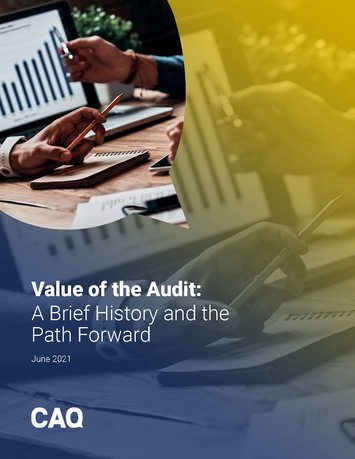The audit of a company’s financial statements requires a wide range of expertise across auditing and accounting standards, complex transactions necessarily involving management estimates, specialists (as recognized by the PCAOB), internal controls over financial reporting, and an understanding of industry sectors and their related business processes and regulatory matters.
Value of the Audit
Enhancing the trust in and reliability of company-reported information is a key aspect of the public interest role that public company auditors play worldwide.
Our capital markets are an important engine for driving and maintaining our economic and societal well-being. These markets operate on data, and audited financial statements have long been a critical element of this information dynamic for their accuracy, transparency, and reliability. As investors make investing decisions, they depend on the information they receive from public company management. As a result, investors need—and in fact have long sought—an independent third party to provide assurance on the information provided by company management.
Examine the importance of well-functioning capital markets to the economy, the historical importance of audited financial statements, and the roles and responsibilities of each key stakeholder in the US financial reporting supply chain.
Download the full report PDF to explore the benefits of an independent audit.
Learn about two key cornerstones of audit quality—the expertise and independence of the external public company auditor.
Understand some of the pitfalls of public policy proposals that seek to apply more stringent requirements on auditor independence to the potential detriment of needed expertise and audit quality.
Explore the growing demand for company-reported information outside of the historical financial statements, and how the independent public company audit construct can be – and in some cases already is – applied to these other key areas of information.
The role of auditors in well-functioning capital markets
Audited financial statements have not only served to fuel economic activity for centuries but have also been a part of the bedrock of the US financial markets for nearly a hundred years. Even before the Securities and Exchange Commission (SEC) required audits of financial statements for publicly-traded companies in the early 1930s, companies submitted their financial statements for independent audit provided by a public company auditor. Why? Because investors and other stakeholders demanded it.
US capital market participants—primarily regulators, investors, company management, board members, and auditors—are working in a world of cooperative tension where everyone has a role and where those roles include oversight in the form of checks and balances. Although there is great value in management’s production of a set of financial statements, it is both a philosophical truth and an empirical fact that the reliability of those financial statements is enhanced by assurance from an independent and expert third party. An independent audit that provides reasonable assurance that these financial statements are free of material misstatements, whether due to error or fraud, increases the reliability of that information and enhances investor and market confidence.
Two Cornerstones of Audit Quality
Many factors lead to a quality audit, but it is the combination of auditor expertise and independence that bolsters the level of trust and confidence in company financial statements and forms the basis of audit quality—and, thus, value to capital markets.
Auditor independence underpins the very credibility of the audit. It is critical that the interests of the external auditor who is providing reasonable assurance over the financial statements are independent of the company in both fact and appearance.
Balancing expertise and independence
From time to time, there have been calls to implement more stringent requirements on auditor independence. Previous public policy proposals advocating to change the structure of the audit engagement – or the structure of the firms themselves – typically underappreciate that there is often a tradeoff between auditor expertise and independence. Attempts at increasing independence requirements, such as doing away with the company-pay model, banning all non-audit services or mandatory firm rotation – may lead to reducing expertise, and result in a decrease in audit quality.
Such proposals also ignore the strong market-based incentives – including reputation, litigation and regulatory incentives – for auditors to have an independent mindset. These incentives are powerful motivators for auditors to perform a high-quality audit, applying their expertise, objectivity, integrity, and professional skepticism. The implication for public policy is that a single-minded focus on merely increasing auditor independence requirements, while ignoring both the market-based independence incentives and the potential negative impact on auditors’ expertise, may not generate the expected effect.
Rather, it is the expertise together with independence of the public company auditor that make up the essential components for the value of the audit and audit quality. Both expertise and independence are necessary, and neither is sufficient. Having an independent third party with the relevant expertise to opine on the financial statements prepared by company management has long been a pillar that provides confidence in the information being reported.
Growing demand for company information outside of the financial statements
Increasingly, public companies are providing other information that investors and other financial statement users are asking for, and relying on, in evaluating a company and making investment and capital allocation decisions. This may consist of other financial information, such as non-GAAP measures, key performance indicators (KPIs), or nontraditional financial and other similar information relating to a company’s environmental, social, and governance (ESG) data. Today, this information is not subject to the same independent auditor review as company financial statements or internal control over financial reporting.
What makes public company auditors a viable option for companies, audit committees, investors, and other stakeholders seeking assurance on the reliability of these new types of information? The answer is simple: this regulated profession – with independent and expert professionals – has a long-standing history of serving the public interest by enhancing the confidence in, and reliability of, company reported financial information. This same confidence-enhancing skillset can meet the needs of the evolving capital markets.
Download the full report PDF to explore the benefits of an independent audit.

